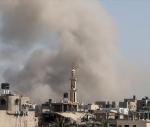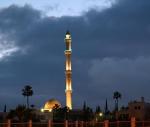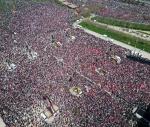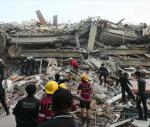You are here
Beirut blast prompts new exodus from Lebanon
By AFP - Aug 17,2020 - Last updated at Aug 17,2020
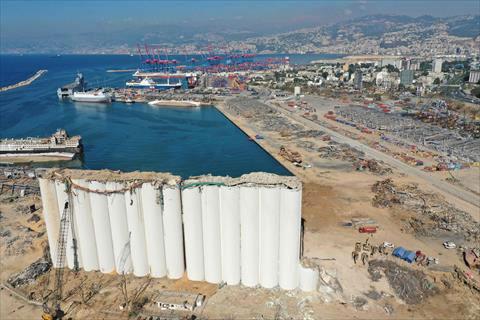
An aerial view taken on Monday, shows the damaged grain silos at the port of Beirut in the aftermath of a cataclysmic explosion that ripped through large parts of Lebanon's capital (AFP photo)
BEIRUT — From his office in Beirut, Shady Rizk had a front-row view of the cataclysmic explosion at the Lebanese capital's port.
Some 350 stitches later, he sees his survival as a miracle, a second chance at life that he is determined not to spend in Lebanon.
The 36-year-old telecommunications engineer is one of many Lebanese who was already fed up with a prolonged economic crisis and moribund public services before the blast brought Beirut to its knees.
The August 4 explosion was caused by hazardous material left unsecured at the port for years, despite warnings over its danger, a fact that further enraged Lebanese who already saw the political class as incompetent and corrupt.
The blast was one catastrophe too many for some — they now see no choice but to leave.
"I do not feel safe here anymore," Rizk said. "God gave me another life, a second chance, I don't want to live it here."
Less than two weeks after the explosion that left his whole body flayed by flying glass, he said he is planning to move to Canada, where he hopes to make a new start with the help of relatives there.
"Anywhere really, just not here. I've lost all hope," he said.
'Physical security'
Lebanon's story has long been one of exodus.
In a country hit by famines, economic crises and a 15-year civil war, no family is without at least one relative who has left for the Gulf, Europe or the Americas, adding to a diaspora estimated at nearly three times the size of Lebanon's population of around 4 million.
In recent months, as Lebanon has sunk deeper into its worst economic crisis since the civil war, thousands of Lebanese have again bought one-way tickets out of the country, seeking work abroad to escape mass layoffs and wage cuts.
Their departures come as disillusionment spreads after an unprecedented protest movement sparked in October 2019 elicited hope for change, but ultimately lost steam.
Canada, one of the top immigration destinations for Lebanese, said on August 13 it was setting up a task force that will ensure "questions related to immigration can be quickly addressed".
A few minutes after the explosion, a shocked Walid called his ex-wife in Paris to say their two children must leave Lebanon to join her.
"She tried to calm me down. I said, 'take them, take them'," the doctor in his 40s said, his voice tight with emotion.
"As a father, I have to put them in a situation where they will not be traumatised, or risk their lives."
Walid was at home with one of his two 17-year-old sons when he heard the rumbling that preceded the massive explosion, which sent a powerful shockwave across the city.
The childhood reflexes of someone who grew up during the 1975-1990 civil war kicked in and Walid pulled his son with him into the bathroom to shield him from the explosion, as his own father had done when he was young.
"The fear I saw on [my son's] face... it went right through me," he said.
Walid, who went to university in Canada and Paris, had planned to send his twins to France for their studies. The explosion has accelerated their departure.
"I would have liked to not make this decision in a hurry," he said.
'Country without a state'
Like many Lebanese, he is furious at the government, which has acknowledged that 2,750 tonnes of ammonium nitrate was left to rot in the heart of Beirut "without precautionary measures".
"It's not unexpected, we live in a country that has not had a state for 40 years," Walid said.
Heiko Wimmen of the International Crisis Group also expects to see many departures abroad among Lebanon's largely highly educated and multilingual middle class.
"It's a very bleak and very realistic assessment," he said.
"People have education and degrees but, more importantly even than that, people have networks," he added, noting that a large number of Lebanese have multiple passports and relatives abroad.
"The country may very well lose a generation it needs to rebuild and to achieve the political change that is necessary," he said.
Sharbel Hasbany, a 29-year-old makeup artist, is now also determined to leave Lebanon, having resisted his mother's pleas to do so for years.
He said he may need to ask for financial help from friends and family to emigrate through online crowdfunding, as his work dried up in the economic crisis and his savings are stuck in the banking system that has blocked dollar withdrawals.
On the day of the explosion, he was in the hard-hit Gemmayzeh district — walking away with 64 stitches.
He listed the names of the bars and restaurants he and his friends used to frequent in the popular nightlife areas just a stone's throw from the port.
"We were there all the time, not knowing we were sitting on a bomb."
Related Articles
BEIRUT — The Lebanese judge investigating the huge explosion that rocked Beirut in August has suspended the probe after two ministers he cha
AMMAN — The Lower House on Wednesday praised His Majesty King Abdullah's directives to dispatch a military field hospital to Lebanon to prov
PARIS — France "regrets" that Lebanon has been unable to form a new government after a mass resignation in the wake of a deadly explosion in








